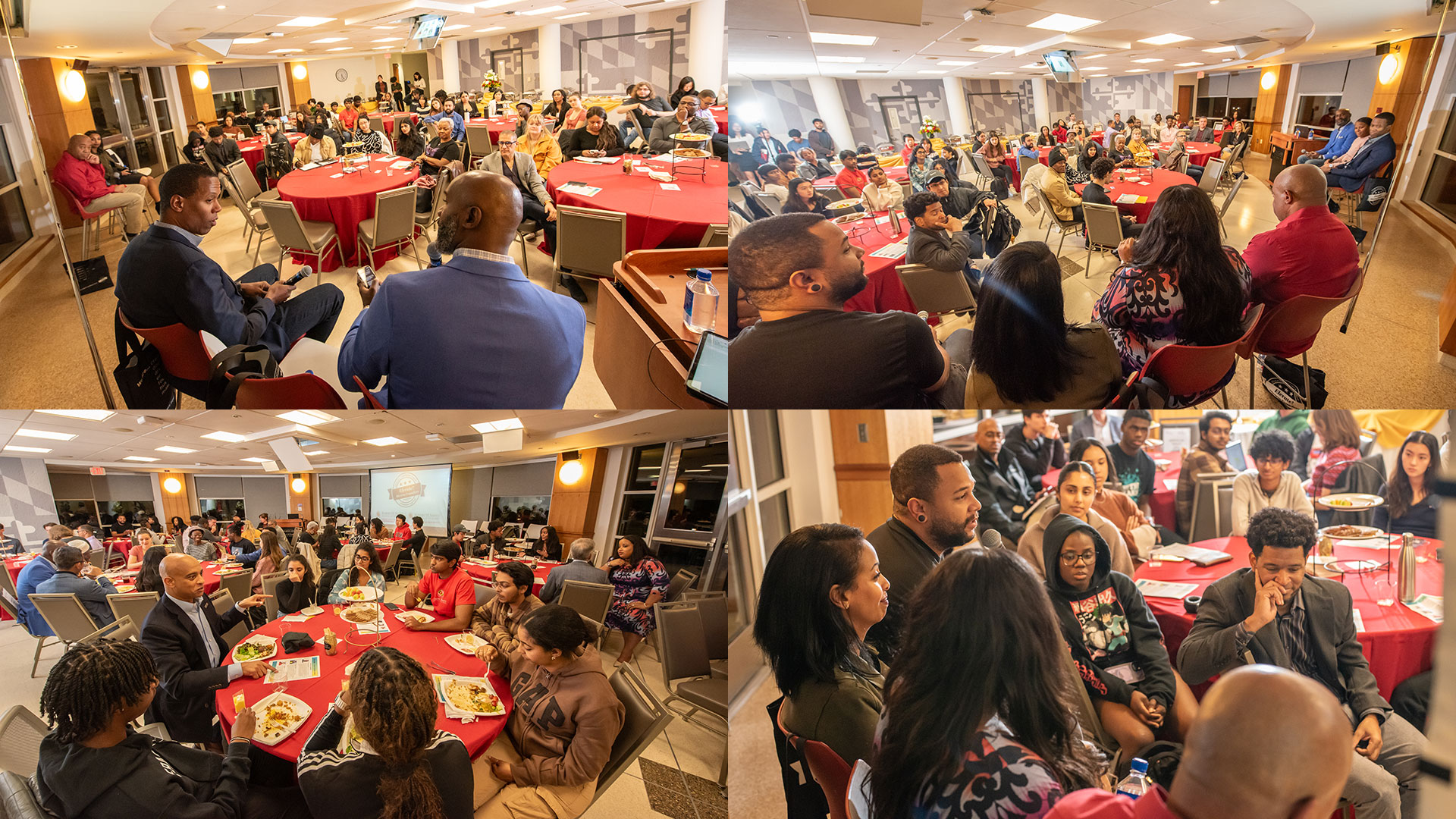
For most entrepreneurs, acquiring capital can be the difference between a vision and seeing their venture come to life. However, for entrepreneurs from marginalized and underrepresented communities, there are even more barriers to overcome.
On Thursday, Nov. 16, a panel of bank executives, entrepreneurs and investors convened in Van Munching Hall to share their lessons in acquiring capital and to highlight opportunities for general business growth for entrepreneurs from underrepresented communities during Elevate! Diverse Founders: Access to Capital.
Hosted for the second consecutive semester by the Dingman Center for Entrepreneurship and the Center for Social Value Creation at the University of Maryland’s Robert H. Smith School of Business, the event celebrates the journeys of minority entrepreneurs. It also provides a space to discuss how to elevate equity and inclusion within entrepreneurship.
As the panel began, business transformation strategist and panel moderator Malcolm Tyson, shared his aspirations for the event—to ignite change in the business landscape and inspire the young entrepreneurs and high school students who were among those in attendance.
“We aim to reshape the narrative where access to capital is a right, not a privilege,” said Tyson. “We're on this journey together, fostering an environment where innovation has no bounds and success is defined by what you bring to the table, not by your affiliation, ethnicity or any other personal attribute.”
During the discussion, panelists offered the following insights to young entrepreneurs on how they should proceed in funding their next big idea:
Make the plan first. Don't find out that a $2 million pitch meeting could turn into a $7 million term sheet, said Remodelmate founder Chad Hall. “The guy who can give you that extra $5 million has some expectations for what you’ll do with that money. That’s the kind of guy who will take your company,” Hall said. “Raise money only when you have a plan for it. You should plan for $2 million, $5 million and even $10 million because that could happen one day.”
Don’t fear the banks. Hiywete “Meme” Mulugeta, vice president and senior branch manager at M&T Bank, has devoted nearly two decades of her career advocating for small minority-owned businesses by helping entrepreneurs understand financing opportunities and ways banks can support their vision. “A misconception people have is they think they have to have their ducks in a row when they come to a bank,” said Mulugeta. “The purpose of a banker is to get your ducks in a row, and if you start from the beginning with us, then we can guide you the right way.”
Relationships are priceless. As an investor, Charles Inokon values entrepreneurs who have a great team around them. It demonstrates that they are adept at building relationships. “When you’re just starting out, relationships are your most important currency. I’ve built relationships with banks, foundations and mission-driven funds,” said Inokon, founder and CEO of Cadence Cash. “These are relationships built over a long period of time before I needed the money. I look for things like that with entrepreneurs because I know they’ll have support throughout the capital-seeking process.”
Grants are great, too. Along her entrepreneurial journey, Arion Long, founder and CEO of Femly, saw a different way forward to secure funding for her ventures—grant funding. “I found programs within Washington, D.C., Baltimore and New York; I applied to anything within a two-hour train ride, and nine times out of ten, we earned that funding. Especially once we nailed down our storytelling,” said Long. “Think about non-dilutive or equity-free funding first because I also think you can use that funding to get the traction you need without taking on VC funding.”
Honesty is the best policy. “Be honest about where you are in your entrepreneurial journey,” said George Ashton III, president of LISC Fund Management. Waiting for five, six or seven questions to give investors a view of the whole picture is a recipe for failure. “Anyone who is a former entrepreneur knows this part of the journey isn’t pretty, but we can’t help you if what you’re telling us is all smoke and mirrors.”
There are always strings attached. Entrepreneurs seeking venture capital need to understand what they’re signing up for. It’s not play money; it’s money that must be returned, said Shalanda Armstrong, managing partner at 100KM Ventures. “The game completely changes the moment you get a VC check because you’ll have to make sure those investments are meeting the metrics. If you’re deciding whether you have something requiring venture capital, think harder about that.”
Media Contact
Greg Muraski
Media Relations Manager
301-405-5283
301-892-0973 Mobile
gmuraski@umd.edu
About the University of Maryland's Robert H. Smith School of Business
The Robert H. Smith School of Business is an internationally recognized leader in management education and research. One of 12 colleges and schools at the University of Maryland, College Park, the Smith School offers undergraduate, full-time and flex MBA, executive MBA, online MBA, business master’s, PhD and executive education programs, as well as outreach services to the corporate community. The school offers its degree, custom and certification programs in learning locations in North America and Asia.